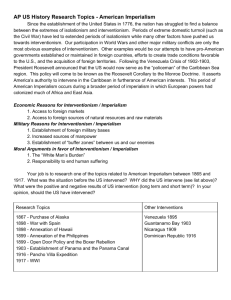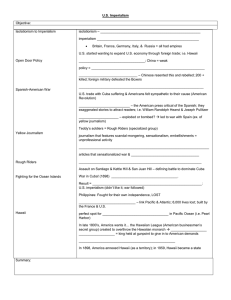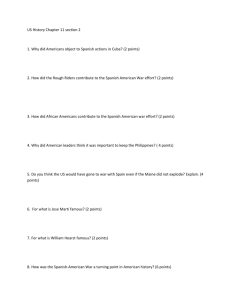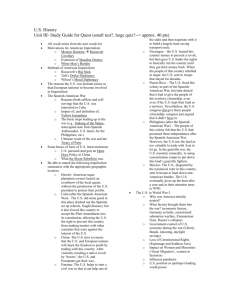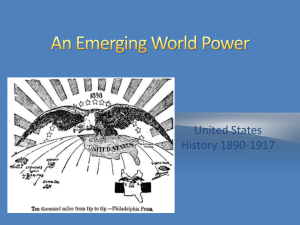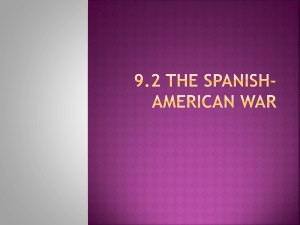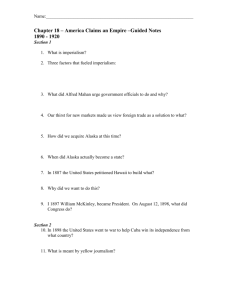American Imperialism EOC 1 Imperialism and World War I
advertisement
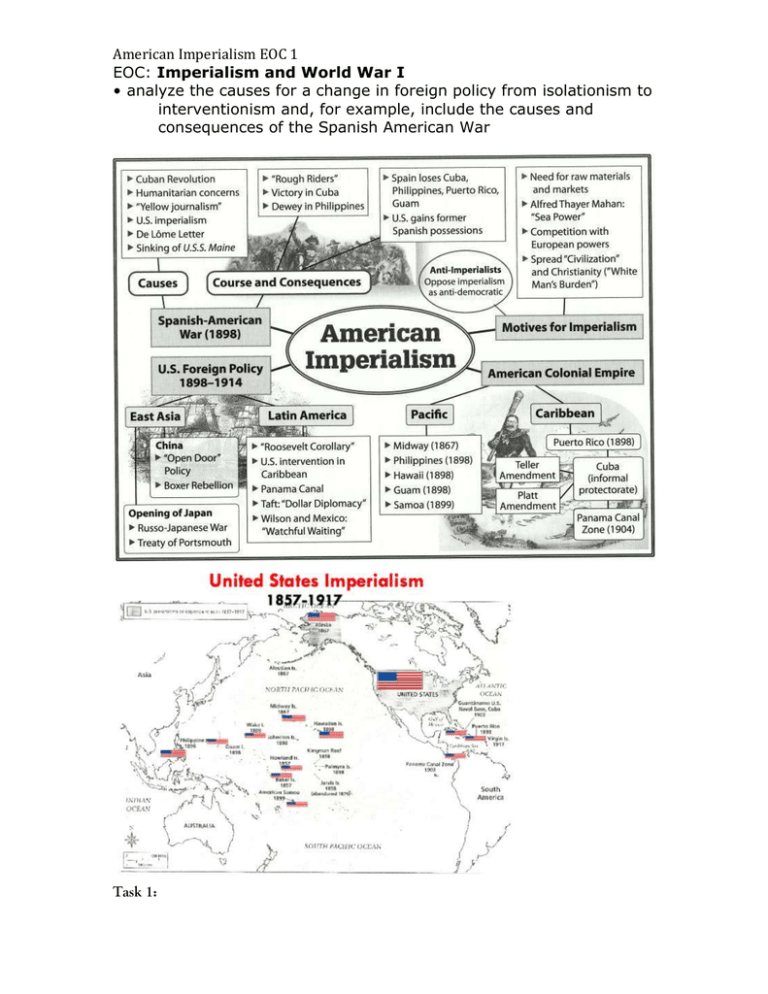
American Imperialism EOC 1 EOC: Imperialism and World War I • analyze the causes for a change in foreign policy from isolationism to interventionism and, for example, include the causes and consequences of the Spanish American War Task 1: American Imperialism EOC 1 EOC: Imperialism and World War I • analyze the causes for a change in foreign policy from isolationism to interventionism and, for example, include the causes and consequences of the Spanish American War Read the chapter “Seeking Empire” as an introduction to the American Imperialism Age. (Link on my website) Address the following task(s): 1. Identify the reason for American foreign policy to move from isolationism to interventionism. 2. Identify the textual information from the reading that led you to your conclusion in #1. Task 2: Read the chapter “Early Stirrings” (link on my website). Address the following task(s): 1. Identify the reason for American foreign policy to move from isolationism to interventionism. Task 3: Read the chapter “Hawaiian Annexation” (link on my website). Address the following task(s): 1. Identify the reason for American foreign policy to move from isolationism to interventionism. 2. Analyze the impact the McKinley Tariff would have on American citizens AND how this would prompt the public to support annexation of Hawaii. • Spanish American War Intro: • The immediate origins of the 1898 Spanish-American War began with the Wilson-Gorman Tariff of 1894. The American tariff, which put restrictions on sugar imports to the United States, severely hurt the economy of Cuba, which was based on producing and selling sugar. In 1898, the US dispatched the USS Maine on a "friendly" mission to Cuba. The ship was to wait, ready to rescue US citizens who might be endangered by the conflict in Cuba. On February 15, 1898 the Maine mysteriously blew up. The US blamed a Spanish mine. McKinley gave the OK for war, and by April, both the US and Spain had declared war. In order to assure the world that it was fighting only for the good of Cuba and not for colonial gain, the US passed the Teller Amendment, which promised to make Cuba independent after the war was over. • On December 10, 1898, the Treaty of Paris was signed, ending the war. The US liberated Cuba, and got Puerto Rico, Guam, and the Philippines as colonies for itself. • The atrocities General Weyler committed in Cuba were massively hyped and sensationalized in the US newspapers, then engaged in a practice known as "yellow journalism". The two kingpins of the press at the time were William R. Hearst and Joseph Pulitzer, who were embroiled in a vicious circulation war, in which Hearst even "stole" Pulitzer's most popular writers by convincing them to defect through promises of money and positions. Hearst's major publication was the New York Journal and Pulitzer's publication was the New York World. In order to grow their circulations, both men were willing to go so far as to make up stories. American Imperialism EOC 1 EOC: Imperialism and World War I • analyze the causes for a change in foreign policy from isolationism to interventionism and, for example, include the causes and consequences of the Spanish American War • Yellow journalism: Then: Now: Readings: “Remember the Maine!” “The Spanish-American War and Its Consequences” Task 4: Choose one of the following articles written during the Spanish American War. Analyze the reading to determine the causes of the Spanish American War. https://www.loc.gov/rr/news/topics/spanishAmWar.html Task 5: Edsby journal response. Analyze the causes (multiple) and consequences (multiple) in foreign policy from isolationism to interventionism. You should probably think about the multiple reasons American Imperialism EOC 1 EOC: Imperialism and World War I • analyze the causes for a change in foreign policy from isolationism to interventionism and, for example, include the causes and consequences of the Spanish American War for imperialism and the various consequences domestically and internationally.
